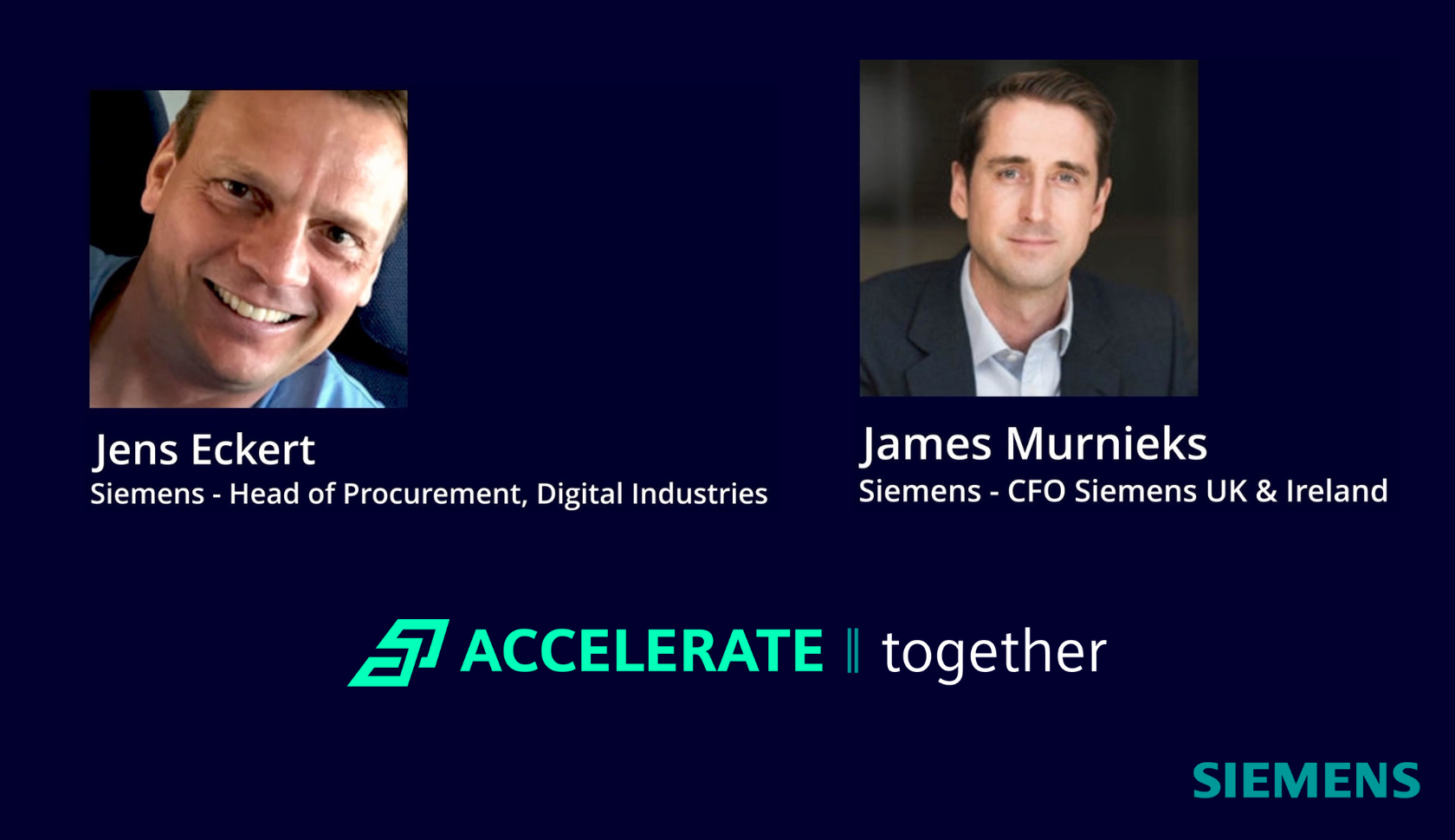Siemens has had a long-standing focus on tackling sustainability head-on. Over the last couple of years, they have been on a journey of delivering real sustainable impact by working with their suppliers and partners towards their major ESG goals including achieving Net Zero by 2030.
‘Accelerate Together’, a multi-day virtual event that took place in May 2023, was a key tactic to inspire and drive change by Siemens Procurement, in partnership with their suppliers. The event focused their supply chain partners and the internal Siemens community on cementing the true value of collaboration while also providing a platform that aids Siemens’ partners to feel more aligned and engaged with their vision for sustainable growth.
Hosting ‘Accelerate Together’ in May 2023, the event saw a successful 86% attendee turnout, with representation from 73 unique supplier companies.
Spanning over 2 half days, day one focused on advocating and motivating suppliers to lean into issues around Decarbonisation, Social Value, and Equity; day two centred around driving action and accelerating impact around the same topics that were introduced during the first day.
Kickstarting the action on day one, attendees were joined by James Murnieks (CFO, Siemens UK & Ireland) and Jens Eckert (Head of Procurement, Digital Industries, Siemens) in a fireside chat with Caitlyn Lewis (CEO, Supplier Day), speaking from the perspective of Siemens Leadership to address key questions surrounding Siemens’ sustainability goals.
Here are 3 key takeaways from the session
1) Strong relationships are key
Siemens’ sustainability strategy, also known as their ‘DEGREE’ framework, aims to address different ESG elements including Decarbonisation, Ethics, Governance, Resource Efficiency, Equity, and Employability. Despite setting clear targets against each of these topics, Siemens recognises the need to work with their suppliers and customers to ensure those goals are actualized.
Speaking on the importance of building strong supplier relationships, Jens Ekert mentioned how Siemens has maintained “long-standing relationships” over several years with their supply chain partners which, when leveraged, can produce thought-provoking discussions around their ongoing ESG priorities, as well as develop practical solutions to their large sustainability challenges.
“We can’t do it alone, it needs to go hand in hand with our partners, with our suppliers and also with other departments within Siemens” – Jens Eckert
According to Jens, Siemens’ Scope 3 CO2 emissions footprint is “30 times bigger” than their Scope 1 and 2. He further went on to describe the breakdown of these Scope 3 emissions, explaining how “only one-third [of carbon emissions] is sitting in tier 1”, while the “other 70%” lies in their tier 2+”.
This underpins the necessity to develop strong supplier and sub-supplier relationships, especially when it comes to tackling decarbonisation, as it allows Siemens to address carbon issues across multiple supply chain tiers and work alongside these suppliers to tackle the source of these carbon statistics.
“From a Siemens perspective, we are also very interested to help” – Jens Eckert
Demonstrating how Siemens works with such suppliers, Jens stated “With the most relevant ones… with the CO2 heavy ones, we are going through those carbon data assessments”, referencing Siemens’ CWA carbon data assessment, before continuing to explain that via “joint interactive discussions, we derive improvement areas” – areas where suppliers are lacking in capability and would benefit from additional support.
From here, Siemens can identify the best way to aid their suppliers to ensure they are able to fulfil their own sustainability agenda, whilst also strengthening their overall supplier relationships
To ensure that suppliers are on the correct and most efficient path to sustainability, it is crucial for Siemens to delve deeper into their supply chain and build strong relationships with the heavy carbon contributors to ensure that they, as well as Siemens, remain on track to meet their sustainability goals.
2) The balance between action and investment
“Everything we are doing within sustainability requires some kind of action or investment or change” – James Murnieks
This was James Murnieks’ stance when discussing the financial KPIs surrounding Siemens’ sustainability goals. James took this opportunity to convey to the attendees the need to build business cases around their sustainability investments, ones that clearly relay the actions/steps they are taking as well as the positive impacts it generates. This ultimately supports the financial investments Siemens is making towards developing more eco-friendly products, businesses, and services, while also building a positive narrative between the investments made and the associated payback period.
“It’s not just about driving sustainability. There needs to be a financial sense behind that” – James Murnieks.
James described this as getting a “win-win scenario”, “one that makes sense for the business but also makes sense in terms of our [Siemens] sustainability journey overall”.
This conversation led Caitlyn Lewis to raise a question about the higher costs typically associated with sustainable actions and investments: “There is often an assumption that sustainability equals a lot of expense.”
James countered this idea by stating that “action doesn’t necessarily mean investment”. He believed that for some sustainability changes, for example, Siemens’ internal change of removing plastic from their canteens, little-to-no investment is required. Instead, such changes simply require a change in behaviour, both from decision-makers and their employees.
Jens also contributed to this discussion, adding that while he loves the examples where more sustainable products/supply chain does not come at an extra cost, he believed that we need to remain conscious that with each new innovation “things start small”, and “they are typically more expensive”.
“We also need to accept that at least for the time being, it [sustainable goods] could be related with higher costs” – Jens Eckert
Despite the higher costs associated with kickstarting more eco-friendly initiatives, it is crucial for organisations like Siemens to strike and maintain a balance between action and investment and focus on producing positive change for their customers and supplier ecosystem.
3) Sustainability goes beyond your suppliers
Sustainability is at the heart of Siemens and its Procurement function, according to James “Sustainability is embedded in everything we do”. However, this dedication towards sustainability expands beyond their supplier strategies and can be seen within Siemens’ business ways and even in their employees.
“For a lot of Siemens employees, it’s their purpose. It’s their reason why they come to work” – James Murnieks
For employees, James expressed, sustainability is their opportunity to “have an impact, not only just on our own operations but in terms of that of our customers and society overall”. He continued on this matter stating that “employees want to work for a business that has a clear roadmap in terms of sustainability”, highlighting the immense value businesses can gain not just from their suppliers but also from their employees who can equally adopt and champion their sustainability efforts.
“It’s all about attracting and retaining the right talent” – James Murnieks
On the other hand for Siemens as a business function, “it’s about our offerings that we can support our customers with on their sustainability journey”. James went on further, claiming sustainability as the best medium to start conversations and enter into tender processes with customers: “It has become the norm. It’s the minimum standard of us explaining what we’re doing as a business in terms of our own operations for sustainability.”
Sustainability has firmly established itself as both a talking and action point within Siemens and their supply chain. It’s a journey they have been steadily embarking on over the last few years so when it comes to inspiring change and striving towards a sustainable future, they know they can reach their goals faster with the help of their suppliers, stakeholders, and internal communities alike.
As global priorities have shifted to spotlight sustainability and decarbonisation, Siemens have found themselves in a favourable position both in the market and their supply chain to execute action-oriented initiatives such as ‘Accelerate Together’. Leveraging their legacy of innovation, they are once again trying new ways to achieve their sustainability goals and, in collaboration with their suppliers, are on track to succeed in materialising their vision for a sustainable future.



